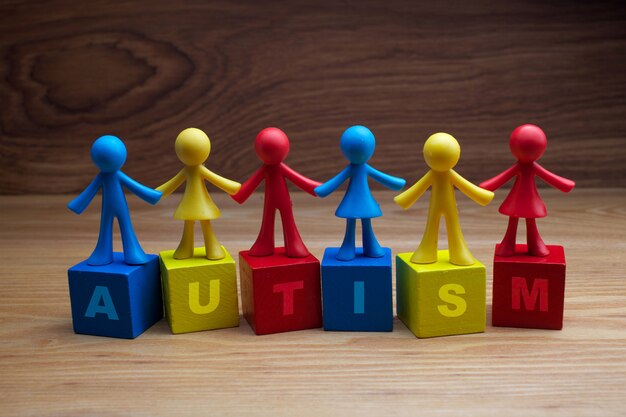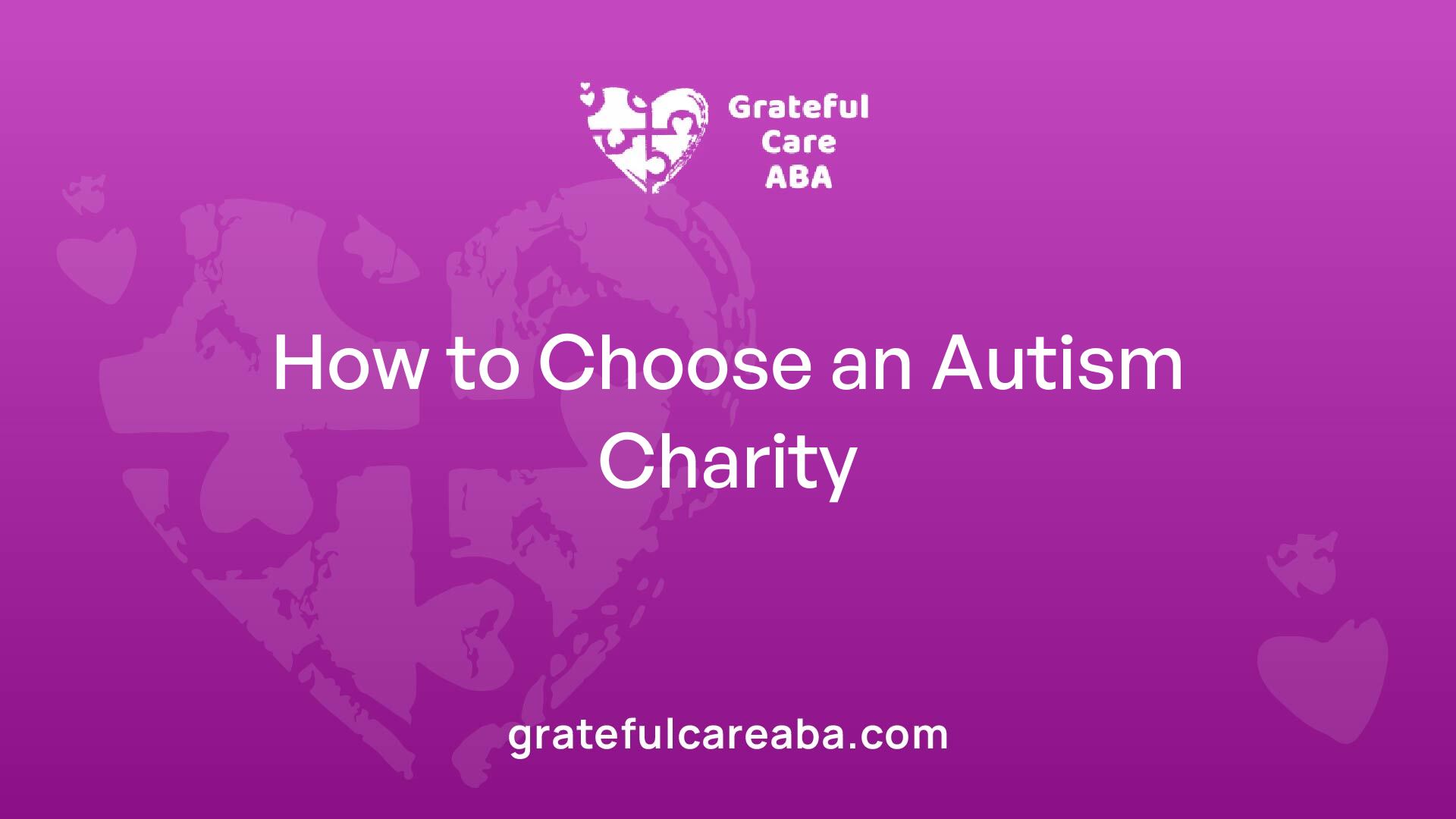How to Choose an Autism Charity
Discover how to choose an autism charity wisely. Ensure impact, transparency, and true support for the autistic community.


Choosing an Autism Charity
When it comes to picking an autism charity, there are a couple of big-ticket items you want to keep an eye on: where the money actually goes and how honest and open the charity is with what they do with it. Are they making sure your bucks are going where you think they should? Can you trust 'em to play fair? That's how you'll know you're backing the right horse.

Funding Allocation
Wanna make sure your donation isn't just disappearing into thin air? Peek under the hood and see how these charities spread the cash around. You want a charity that gives a good chunk of its donations right back to the cause. Take Save the Children, for example—they promise that 85% of your dollar helps kids in need. That's what you want: a charity that's putting your hard-earned money to work helping those with autism.
Accountability Standards
Accountability is the name of the game when it comes to trusting an autism charity. If they're swimming in cash—over a million bucks a year—they need to be getting those financial statements reviewed to keep everything on the up-and-up. According to Charity Navigator, they should be doing audits to show everything's as it should be. Even the smaller fish, bringing in between $500k and $1 million, should have someone checking their books—even if just a review or compilation.
Having a smart gang of people running the ship helps, too. If the charity’s got a panel—three or more on the board who are independent—it's a good sign. Bigger orgs counting heavily on donations should ideally have five independent members calling the shots to prevent any funny business.
Any hanky-panky with loaning cash to or from the big wigs? Not cool. Keeping that on the level is crucial. And if they're really raking in the dough—think over $50 million—they've got to keep their cards visible, sharing everything from their CEO's name and paycheck, to their donor privacy policy, all on the IRS Form 990, according to Charity Navigator.
So, put these funding and accountability stuff in your brain’s shopping cart before choosing an autism charity. Doing your homework means you’ll contribute to a cause in line with what you believe in, making a positive splash in the lives of those with autism.
Impact of Autism Charities
Autism charities are lifelines for families and individuals touched by autism spectrum disorder (ASD). These organizations step up to provide vital services, resources, and advocacy, making a tangible difference in the lives of those affected. Think of them as the glue that connects people with autism to the support they need, offering everything from educational programs to therapy services, community gatherings, and helping hands for families [1].
Support Services
Autism charities shine brightest through their range of support services for those with autism and their families. Here's what they offer:
- Educational Programs: These programs open the door for individuals with autism to learn and succeed. They're designed specifically to meet the needs of people on the spectrum, helping them grow and succeed in school.
- Therapy Services: Autism charities ensure access to therapies like speech, occupational, and behavioral therapy. Each type of therapy tackles different hurdles faced by those with autism, helping them manage daily challenges.
- Community Initiatives: Creating a sense of belonging, these initiatives build inclusive spaces where those on the spectrum feel welcomed and understood, encouraging social bonds and connection.
- Family Support Networks: Charities often establish networks to guide, support, and provide resources to families, helping them navigate life with an autistic family member.
Advocacy Efforts
Autism charities champion the rights and inclusion of individuals with autism. Their advocacy efforts pave the way for:
- Increased Global Awareness and Inclusion: Working tirelessly to spread the word about autism and pushing for more inclusive environments for people with autism around the world.
- Better Understanding of Diversity: Charities educate on the unique needs and strengths within the autistic community, promoting acceptance and appreciation of neurodiversity.
- Advocacy for Rights: They fight for equal rights for autistic individuals, advocating for services and support in various life aspects.
- Support and Services Access: Charities strive to enhance access to crucial services, support systems, and forward-thinking research, advancing care and treatment for autism.
Organizations like Autism Speaks have reached noteworthy milestones with initiatives like raising global awareness and improving service access. By funding research and supporting programs like the Caregiver Skills Training (CST) program and the Autism Care Network, these charities empower families, equip caregivers, and enhance the care and support available to individuals with autism. This not only amplifies the potential of people on the spectrum but also strengthens the sense of community and well-being among all involved.
Criteria for Selecting a Charity
Choosing the right autism charity for support can feel like finding a needle in a haystack, but with a bit of focus on the essentials, folks can make sure their donations truly hit the mark. The real game-changers to think about are mission connection, money habits, and the real-world magic of their programs.
Mission Alignment
First stop on this charity train is making sure your chosen charity is singing from the same hymn sheet as you. If their goals give you all the feels and match your donation dreams, that's a good sign. Peeking into the charity's corner of the internet—their website, mission blurb, and past wins—can reveal whether you're on the same wavelength. When a charity shares your vision, you can bank on your donation actually making a difference for those tackling the world with autism.
Financial Transparency
Next up: the money talk. Getting the scoop on how a charity plays with numbers is key. You want your cash doing hard work, not chilling in some shady black hole. Donors should dig into annual reports, flip through those financial statements, and even check out tax docs like Form 990. This detective work can assure you that they mean business. Seeing clear, honest financials can set your mind at ease, knowing your donation's heading straight to where it can do some good.
Program Effectiveness
Finally, it’s all about results, baby! Peeking into a charity’s past work paints a picture of their impact on the autism community. Are they walking the walk and showing real returns from their efforts? Dive into their reports, hear the success stories, and learn about the support they dish out through therapy, learning programs, and community outreach. Keep an eye open for those heartwarming testimonials and teamwork alliances that show they’re not just a talk shop, but sincerely making life better for those on the autism spectrum.
By sizing up mission compatibility, financial straight-shooting, and program success, folks can make a call that aligns with their core values. It also ensures their contribution delivers real support, championing those dedicated to uplifting the autism community.
Evaluation of Autism Charity Ratings
When checking out autism charity ratings, it's a good move to look at evaluations made by impartial organizations and the criteria they use. These ratings offer a peek into a charity's financial health, impact, how they run things, and if they really get stuff done.
Independent Organizations
Impartial groups come in handy when rating how autism charities are doing. These folks dig deep to give donors and supporters honest ratings—no spin. By trusting these scores from well-respected groups, you can feel more confident about picking the right autism charity to back.
Criteria for Assessment
When weighing up autism charities, these impartial groups check several important factors to see how effective and efficient the charities truly are in helping individuals with autism and their families. Here's what they typically look at:
- Financial Transparency: Charities making over $1 million need to get their finances audited thoroughly. This is to make sure money is managed right [2]. Knowing where your donation goes helps guarantee that you’re supporting a charity that has its financial house in order.
- Program Impact: Looking at how a charity’s programs fare is a big deal. It shows whether they really make a difference for people with autism. Charities that can prove they get results and improve the lives of those they serve tend to be the ones that donors should keep an eye on.
- Governance and Leadership: How an organization is run and the folks in charge matter a lot. Charities with a solid, independent board who care about being accountable and open often do a better job supporting the autism community [2].
By watching these key factors and trusting ratings from solid sources, you can make sure your donations hit the mark. It's about ensuring the charity is dedicated to really making a difference for people with autism. Do your homework, check those ratings, and find a charity that clicks with what you value and aim to achieve.
Factors to Consider
Thinking about which autism charity to back? It's worth taking a moment to peek behind the curtain. Focus on three main things: how they handle money, how effective their programs are, and who’s calling the shots.
Financial Transparency
Before you open your wallet, check if the charity shows its numbers. By law, nonprofits need to spill the beans on their books if you ask, showing tax forms like the IRS Form 990 and their tax-exemption paperwork. This isn't just a bunch of paperwork—a charity that puts its finances out there gains the trust of its donors and team, creating a good atmosphere and connection with the community.
Many autism orgs worth their salt will have their financials, including those IRS forms, ready to view on their websites. They’re waving a flag of transparency, making it a cinch for anyone to see where the money’s coming and going.
Program Impact
Jumping to programs, you want to know: do they make a real difference? It’s not just about numbers or spreadsheets; what’s the story they’re telling with their results? Look for the ones sharing outcomes and success tales or feedback from the folks they've helped.
Go beyond just talk. Seek out charities that have numbers and stories to back their claims—like how many people they’ve supported, how their services stack up, and the long-lasting benefits they’ve sparked for folks with autism and their families. Picking a group with a proven track record means your donation won't just vanish; it’ll matter.
Governance and Leadership
Lastly, who’s steering the ship? The brains and brawn leading the charity say a lot about their ethics and focus. You’ll want to check out who sits on their board, how their leadership is structured, and whether the CEO's paycheck is a mystery or public knowledge in their financial documents. And having audited statements up for grabs on their site is definitely a plus.
A charity with sharp leadership and solid governance is like a well-oiled machine—ready to make big decisions, adapt, grow, and, most importantly, use resources wisely for the autism community’s benefit. Make sure they’ve got their act together to make every dollar count.
References
[1]: https://www.yellowbusaba.com/post/how-to-choose-an-autism-charity
[2]: https://www.charitynavigator.org/about-us/our-methodology/ratings/accountability-finance.html
Apply Now
At Grateful Care ABA, we are proud to offer the best ABA therapy services in Indiana. Armed with a team of skilled Board Certified Behavior Analysts (BCBAs), we bring years of experience to the table, making us the preferred provider for ABA therapy in our community.
Understanding that every child with ASD is unique and has unique goals and objectives, our ABA therapists carefully craft personalized ABA therapy plans that are tailored to meet the specific needs of each child. Whether your child needs help with reducing maladaptive behaviors, your child needs IEP support at school, you want your child to be self-sufficient at home, or something else, we use ABA therapy to work diligently toward specific goals. Together we can make a difference in your child’s life!
Contact us today to connect with an ABA therapist and learn more about ABA therapy solutions for your child.

































































































